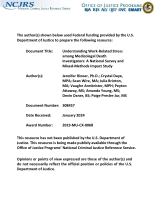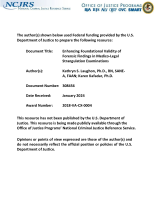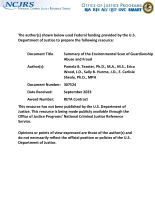Legal research
False Memories and True Memories of Childhood Trauma: Balancing the Risks
The Impact of Neighborhood Status on Imprisonment for Firearm Offenses
U Visa Certification Patterns and Coverage: A Case Study in the Southeastern United States
Enhancing Foundational Validity of Forensic Findings in Nonlethal Medico-legal Strangulation Examinations
Contemplative Practices and the Movement Toward a More Just Criminal Legal System
Legal Coercion and Drug Abuse Treatment: Research Findings and Social Policy Implications
Labor Trafficking in Construction and Hospitality Topical Brief: Immigrant Workers
Improving the Systems Response to Victims of Human Trafficking with Substance Use Disorders in Minnesota
Developing a Model for Providing Feedback to Reporters of Elder Abuse
Firearm Purchase Behavior and Subsequent Adverse Events
Jury Deliberations of Child Witnesses with Autism Spectrum Disorder
Leisure Risk for Youth on Probation: How it Relates to Recidivism and How Probation Officers Address it in Case Planning
Enhancing Risk-Need-Responsivity Implementation: An Evidence-based System for Case Management Support
Bail, Bias and Bargaining: Investigating Racial Dynamics in Plea Negotiations across Local Court Communities
Just Science Podcast: Just Increasing Access To Drug-Checking Services
Understanding the Impact of COVID-19 on Victim Services
The COVID-19 pandemic had a detrimental impact on communities across the nation and significantly affected various aspects of individuals’ lives. One of the negative impacts was an increase in gender-based violence accompanied by shifting barriers to accessing services and support. Victims and victim service providers faced various challenges dealing with the increase in need for services, navigating barriers to help-seeking, and addressing logistical issues.
See the YouTube Terms of Service and Google Privacy Policy







